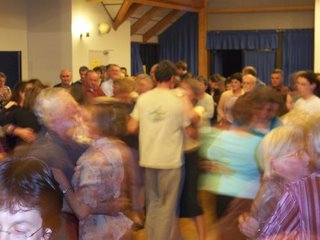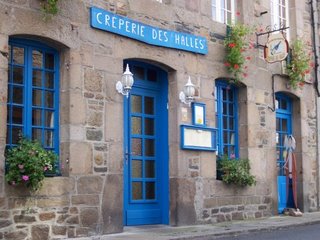Chapter Three: Jacques of All Trades

“Do not go where the path may lead; go instead where there is no path and leave a trail.”
This legendary statement of Ralph Waldo Emerson, which was also the Norwell Class of 2002's “Class Words of Wisdom,” has thus far been the mantra of my journey as a plouc here in Breizh. Indeed, majoring in French and living in France as an American in the new millennium could be considered the “road not taken” (thank you, Frost) as the nation today is turning its eyes upon Spanish.
You've read the tale of how I landed in Lannion, France. However, this is merely one part of the story—but a sampling of the footprints I am leaving along this journey. In fact, I have already begun to create various roles for myself as a Hoosier immersed within the Breton culture. I am, indeed, an educator by day, an ocean-chaser in my spare time and a Breton dancer by night.
This is my story...
The Educator:
 Introductory lessons at the Lycée Joseph Savina, at which I will be teaching the English language and American culture until April of 2007, have already provided me with a variety of life lessons.
Introductory lessons at the Lycée Joseph Savina, at which I will be teaching the English language and American culture until April of 2007, have already provided me with a variety of life lessons.The following—three sample questions posed by students along with my responses—are merely a few examples of these lessons:
Student: “How old are you?”
Me: “How old do you think I am?”
Student: “I don’t know.”
Me: “Okay, let’s take a class vote. Take a guess, anyone...”
Lesson: Students generally perceive teachers as older than they are. The overwhelming majority of students assumed I was 25. As for the outliers, one lone girl guessed 35, whereas one boy said 15 (while laughing).
Male Student: “Have you got a girlfriend?”
Me: “No.”
Male Student: “Some of the girls in the class are interested.”
Female Students: Chuckling
Lesson: There are certain lines which should not be crossed. Following one of my sessions, Abraham, the Mexican assistant, said he heard a few giggling girls proclaim, “22 and single!”
Student: “Have you any ubbies?”
Me: “Excuse me?”
Student: “Have you any ubbies?”
Me: “Ubbies?”
Student: “Yes. Have you any ubbies?”
Me: “Oh! Hobbies!”
Student: “Yes. Ubbies.”
Me: “Yes, I have many hobbies...”
Lesson: The students’ acquired English (as opposed to American) accents, coupled with their charming French pronunciations, can impede comprehension. I was hearing “hubbies” while she meant to convey “hobbies.” Of course I assumed she was not asking whether or not I had several husbands. But, then again...c’est la France...
Another example of accents impeding comprehension:
Me: “What’s your name?”
Student: “My name is funny."
What I wanted to say: “It’s funny, huh? Well, tell me. Maybe I’ll laugh!”
What I really said: “Excuse me?”
Student: “Funny. My name is funny.”
Me: “I’m sorry. I’m having a hard time understanding. One more time?”
Student: “Funny.”
Me: “Uhh...okay. How do you spell your name?”
Student: “Funny: F-A-N-N-Y.”
Me: “Oh! Fanny! Uhh...I mean...‘Funny.’ Nice to meet you, Funny.”
Since these introductions, I have already experienced both euphoria and the pit of embarrassment in my role as an English assistant teacher.
Euphoria has come from teaching in this awe-inspiring village. Tréguier has roots which lie in the sixth century—when Saint Tudwal, one of the seven founder Saints of Brittany, emigrated to the wild Breton terrain and founded a monastery therein—which, for an American, is difficult to comprehend. My country, for example, is younger than the house in which I was invited to dinner by a fellow teacher recently.
 Furthermore, the school building is an ancient seminary / chapel which, naturally, causes my secondary alma mater’s Norwell Castle to pale in comparison. The building itself is indeed a chef d’oeuvre (masterpiece). And, the rest of the village is charming, as well. I often look out the window in the midst of a lesson and feel the impulse to pinch myself. Can it be true? Can I really be teaching in the midst of such ancient beauty?
Furthermore, the school building is an ancient seminary / chapel which, naturally, causes my secondary alma mater’s Norwell Castle to pale in comparison. The building itself is indeed a chef d’oeuvre (masterpiece). And, the rest of the village is charming, as well. I often look out the window in the midst of a lesson and feel the impulse to pinch myself. Can it be true? Can I really be teaching in the midst of such ancient beauty? This sentiment of mirth is only strengthened by my clientele. The Lycée Joseph Savina has many special programs geared toward the arts, such as options for specialization in cinema, applied arts, etc. Thus, students from all over Brittany come to study at this school because they are passionate about some topic or art. They are already engaged. Anyone who has been given the task of teaching youngsters will understand what a blessing this is. Impassive students, though they do exist in Tréguier, are certainly not the majority.
This sentiment of mirth is only strengthened by my clientele. The Lycée Joseph Savina has many special programs geared toward the arts, such as options for specialization in cinema, applied arts, etc. Thus, students from all over Brittany come to study at this school because they are passionate about some topic or art. They are already engaged. Anyone who has been given the task of teaching youngsters will understand what a blessing this is. Impassive students, though they do exist in Tréguier, are certainly not the majority.And, it is now uncommon for me to cross the school courtyard without hearing some student yell (in English) “Hello! How are you?” They seem interested to have someone from exotic Indiana here to spend the school year with them.
Nevertheless, my honeymoon with the Tréguier students was destined to come to an end—and what a bitter end it was.
As I live about twenty minutes from the school, I am often forced to take the public bus. Sometimes I am successful in securing a ride with another teacher; however, this is not always the case. And, as there is no big banana of a bus provided especially for the students, they take the same one as I do.
The most important lesson I have learned thus far: no teacher should ever be forced to ride the bus with a load of immature high schoolers. Never.
Walking onto the bus, I felt as if I had immediately shrunken back into middle school Seth (which, contrary to popular thought, was actually shorter than my current stature). Anxiety churned within my stomach. I looked up and down the aisle, praying that I would find a vacant bench. Relief swelled upon my location of one such unoccupied seat. However, a few minutes later I felt something lightly brush my hair.
“You’ve got to be kidding me,” I said to myself. I knew instantly what it had to be: a spit wad. A few moments later, something sailing over my head caught my eye, but I was unable to identify it. No matter, soon another came and landed right in my lap. It was a tiny bit of bread squished into a ball.
“You’ve got to play it cool,” I coached myself. “Pretend as if you didn’t feel anything.”
This, however, became difficult as the diabolic student violently upped the ante. The balls of bread became larger. Then came a magnet. Then a snotty kleenex. Then an opened bar of chocolate.
Steam poured from my ears, and I fought the urge to jump upward from my seat and lecture the students in impeccable French. However, my position had rendered me unable to identify the culprit. And, so, I formed a plan—a perfectly, wonderfully evil plan: gathering all of the items hurled in my direction (with great care in the case of the snot-laced kleenex), I prepared to sneak peaks backward in order to determine which of the smiling faces was the villain. Then, at the school I would find him/her, waltz up to his/her desk and drop the items thereupon while smiling and saying, “I think you lost these on the bus.” It was a good plan—a plan to fight childish fire with sophisticated flames.
Alas, it was not to be. A few moments after Mr. Hershey landed in my seat, a student snuck up to me and asked for his chocolate back. Shocked that he actually believed I would return it to him, I merely looked at him in disbelief. He then explained that he had been trying to throw various items at the girl in front of my seat and I raised the package of goodies I had collected.
“So you’ve been throwing these at her?” I asked, gesturing to the seat ahead of me. The girl then turned and glared at the boy. Relief began to replace the anger coursing through my veins. I had not been the hated target. Rather, I had simply been caught in the middle of a young French lover showing his affection by throwing chocolate and snotty kleenexes at his beloved. (What better way to make a girl swoon than throw mucus from ones nose at her?)
Of course, I did not return the chocolate. I allowed him to watch as I dumped it in the trash can after descending from the bus.
Euphoria to embarrassment: thus far the former has thankfully far outweighed the latter.

The Ocean-Chaser:
Fridays are days of adventure for this plouc in Brittany. As I do not teach on this day, I often grab my journal, camera, bus schedule and just go—to where it does not matter as much as the simple fact that I am going. Thus far, my location of choice has been the Pink Granite Coast.
 La Côte de Granit Rose is constantly changing. At high tide, the sapphire water laps at the seashore and is dotted by isles and rocks peeking upward from its hidden depths. At low tide, the ocean retreats to unveil a secret landscape: what before appeared to be mere rocks peeping above the surface of the water are stripped to reveal their sheer majesty and presence as massive boulders. Caverns of mystery and shadows of adventure are exposed for but a short time until the ocean returns to once again hide her secrets from view.
La Côte de Granit Rose is constantly changing. At high tide, the sapphire water laps at the seashore and is dotted by isles and rocks peeking upward from its hidden depths. At low tide, the ocean retreats to unveil a secret landscape: what before appeared to be mere rocks peeping above the surface of the water are stripped to reveal their sheer majesty and presence as massive boulders. Caverns of mystery and shadows of adventure are exposed for but a short time until the ocean returns to once again hide her secrets from view. This call to adventure is the siren’s song I heard on one such Friday when I had jumped on the bus. Landing in Trégastel, I immediately noticed the ocean had fled from the shore, beckoning me to explore the normally hidden landscape. I suddenly felt overcome by the desire to reach the ocean, to beat her at her own game and prove that she could run but she could not hide.
This call to adventure is the siren’s song I heard on one such Friday when I had jumped on the bus. Landing in Trégastel, I immediately noticed the ocean had fled from the shore, beckoning me to explore the normally hidden landscape. I suddenly felt overcome by the desire to reach the ocean, to beat her at her own game and prove that she could run but she could not hide.And, therefore, I dubbed myself the Ocean-Chaser.
 Scaling the boulders, picking my way around clumps of seaweed and admiring mussel-like creatures still clinging to the exposed rock, I slowly pursued the retreating water. In my mind I recalled the bit of wisdom I had been given by the Principal of the Lycée Savina: be careful when climbing the boulders revealed by the low tide, for once the tide begins to return, it can do so rapidly and overtake you.
Scaling the boulders, picking my way around clumps of seaweed and admiring mussel-like creatures still clinging to the exposed rock, I slowly pursued the retreating water. In my mind I recalled the bit of wisdom I had been given by the Principal of the Lycée Savina: be careful when climbing the boulders revealed by the low tide, for once the tide begins to return, it can do so rapidly and overtake you.“But I am the Ocean-Chaser,” I told myself. Naturally, I could handle it. I would know when to turn back in time. Thus, I continued to explore.
 After hiking out perhaps one third of a mile, I at last stood proudly at the top of one particularly immense boulder and proclaimed, “I’m King of the World!” I had reached the ocean. Picking my way down from the rock, I sprang upon my unsuspecting prey. Thrusting my hand in the water, I took pride in proving myself capable of crossing uncharted territory to reach my goal. The ocean, oblivious to my moment of victory, continued to lazily lap at the pebbles, sand and rock.
After hiking out perhaps one third of a mile, I at last stood proudly at the top of one particularly immense boulder and proclaimed, “I’m King of the World!” I had reached the ocean. Picking my way down from the rock, I sprang upon my unsuspecting prey. Thrusting my hand in the water, I took pride in proving myself capable of crossing uncharted territory to reach my goal. The ocean, oblivious to my moment of victory, continued to lazily lap at the pebbles, sand and rock. “Is the tide still retreating or is it coming back,” I asked myself. Unsure, I once again ascended the rock to take pictures. The words of my Principal played again like a tape recorder in the back of my mind, but I pushed them away. Surely I would be clever enough to leave at the needed moment. Therefore, I reclined upon the rock, pulled out a baguette and Pepsi, and had a nice picnic above the sea.
“Is the tide still retreating or is it coming back,” I asked myself. Unsure, I once again ascended the rock to take pictures. The words of my Principal played again like a tape recorder in the back of my mind, but I pushed them away. Surely I would be clever enough to leave at the needed moment. Therefore, I reclined upon the rock, pulled out a baguette and Pepsi, and had a nice picnic above the sea.Perhaps fifteen minutes later, I noticed the landscape was once again changing. The water appeared to be just a bit higher than before. “Time to go,” I told myself, turning to head back the way I had come. Climbing from one rock to the next, I came over a bend to notice something strange: my peninsula had become an island. There was water all around me—in ever direction.
 Slightly unnerved, I turned and turned, looking for dry land, but none was to be found. I had precious few options and very little time to consider them: 1. Cross the water, 2. Stay upon the rock until the next day when the tide would once again pull the water out to sea.
Slightly unnerved, I turned and turned, looking for dry land, but none was to be found. I had precious few options and very little time to consider them: 1. Cross the water, 2. Stay upon the rock until the next day when the tide would once again pull the water out to sea.Thus, I pulled off my shoes and socks, rolled up my pants, checked to make sure my camera was secure in my book bag and stepped into the water. Thankfully, it was only up to my knees, but the channel I crossed was perhaps ten feet wide. Interestingly enough, I was forced to repeat this process once again before I finally made it back to the shore.
Perhaps Ocean-Chaser-in-Training is a more fitting title.
 (This picture was staged a few moments after the incident in an area in which the water was not as high.)
(This picture was staged a few moments after the incident in an area in which the water was not as high.)The Breton Dancer:
 Flowing cider, hot crêpes, lively music and a community which dances together: welcome to the Fest Noz!
Flowing cider, hot crêpes, lively music and a community which dances together: welcome to the Fest Noz!Entering my first Fest Noz festival several weeks ago, my eyes widened with wonder. I tried in vain to soak in every image; to inhale every scent; to appreciate every note emerging from the flutes, clarinets, mini-accordions and bagpipes.
Indeed, I had stumbled into Paradise in the middle of Plou-somewhere, Brittany.
 Fest Noz means, literally, “Night Festival” in Breton. During the entire year, these festivals of music and dance are held in both large cities and tiny villages throughout Brittany. It is a celebration of Celtic culture. It is an opportunity to foster community. It is, indeed, my favorite aspect thus far of the Breton culture.
Fest Noz means, literally, “Night Festival” in Breton. During the entire year, these festivals of music and dance are held in both large cities and tiny villages throughout Brittany. It is a celebration of Celtic culture. It is an opportunity to foster community. It is, indeed, my favorite aspect thus far of the Breton culture.Today when we think of Celtic music, our minds naturally turn to Ireland and Scotland—and, rightfully so. However, we are often too ignorant of the rich musical heritage whose roots run deep into Brittany. This vibrant tradition can still be found at the Fest Noz, for indeed the purpose of such a festival is chiefly to celebrate music and to dance. Well-known groups and local individuals alike take their turns leading rousing numbers. Others will join the ensembles to sing in Breton or lead the dance numbers with their voices alone in stirring a capella renditions.
 And, everyone dances. This is not a middle school dance where most stand bashfully on the sidelines to watch only the talented cheerleaders light up the floor. Rather, this is a truly communal event where everyone steps forward together to clasp arms and travel around the room in a large circle.
And, everyone dances. This is not a middle school dance where most stand bashfully on the sidelines to watch only the talented cheerleaders light up the floor. Rather, this is a truly communal event where everyone steps forward together to clasp arms and travel around the room in a large circle.Truly, the Fest Noz displays the true essence of folk music and folk dancing. Although the musicians are quite adept at their skill, the purpose is not merely to sit idly and to appreciate their art. Rather, each song has at its center a beat which corresponds to a particular dance with which the natives have been familiar since their childhood. Thus, the purpose is to lead the crowd in one such dance—to give them the needed beat to come together as one folk.
 Watching such at my first Fest Noz, I couldn’t help but wonder if I had fallen back into some lost era. I felt as if I were in Jane Austen’s famed Pride & Prejudice, watching an entire community share in dance together. Overcome by the desire to join the throng, another assistant, Kristen, and I joined the circle. Watching the feet of those beside us and trying to mimic their every move, we held on tightly to our neighbors as we flew around the room with the group.
Watching such at my first Fest Noz, I couldn’t help but wonder if I had fallen back into some lost era. I felt as if I were in Jane Austen’s famed Pride & Prejudice, watching an entire community share in dance together. Overcome by the desire to join the throng, another assistant, Kristen, and I joined the circle. Watching the feet of those beside us and trying to mimic their every move, we held on tightly to our neighbors as we flew around the room with the group.The sights, the sounds, the smells: all of it was delightful (well, except for the putrid b.o. rising from the occasional dancer clasping my arms in the circle—a sign that it was time to sit out a dance and wait for another point of entry to present itself).
 It is this celebration of community, music and dance which I hope to bring back to Hoosierland next year (just you wait, Aeschlimans, for the next Ash Bash when I’ll bring my Breton music and lead you all in something even more exciting than our annual Locomotion)!
It is this celebration of community, music and dance which I hope to bring back to Hoosierland next year (just you wait, Aeschlimans, for the next Ash Bash when I’ll bring my Breton music and lead you all in something even more exciting than our annual Locomotion)!Educator, ocean-chaser and Breton dancer: indeed, I have become a Jacques of all trades in the beautiful land of Breizh. And yet, the adventure has only just begun. The trail I am leaving as part of this journey has proven already to be full of both mistakes made by myself and unexpected jewels awaiting discovery.
I can’t wait to continue.








